Google is holding a big search event at the San Francisco MOMA this morning. The company has not released any specific information about the content of today’s announcements, but the recent doodles on Google’s homepage and various Twitter messages from the official Google accounts point towards a faster search experience, possibly with streaming, as-you-type search results. We assume that this will be the core of today’s announcements, but there will surely be a few surprises as well.

The event is scheduled to start at 9:30am PT/12:30pm ET. You can find our live blog below.
Google’s VP for search products and user experience Marissa Mayer will speak at today’s event. Other speakers include Johanna Wright (director of product management), Ben Gomes (distinguished engineer) and Othar Hansson (senior software engineer).
Live Blog
9:15 AM: The live video stream on YouTube is now available here.

9:21 AM: We are seeing some reports that you can already try Google’s instant search by going to this URL: http://www.google.com/webhp?sclient=psy

9:32 AM: Still waiting for the event to start. Until then, you can read the FAQ for Instant Search here. According to Google, Instant search can “save 2-5 seconds per search.”
9:35 AM: Here we go. Google PR spokesperson Gabriel Stricker on stage, taking care of housekeeping items (WiFi, etc.).
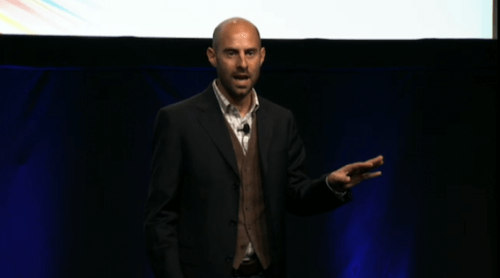
9:37 AM: Why are we here? “State of the Union.” Give everybody a sense of “where we are and where we are going.”
9:38 AM: “Today, we are going to talk a lot about speed.”
9:38 AM: “What we do is part art and part science.”
9:39 AM: Marissa Mayer takes over.
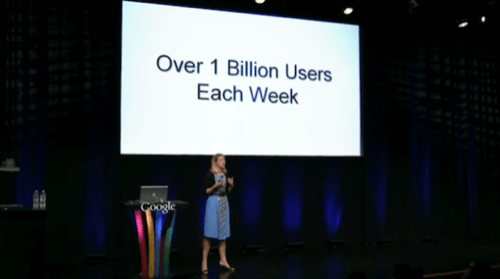
Google now has over 1 billion users on its sites every week. Rolled out hundreds of search enhancements in 2010. “This stands to be the best year ever for Google Search.”
9:40 AM: Recap of new search features released so far this year: real-time, Caffeine, timeline views, better spelling correction, integration of Google Squared results.
9:42 AM: Also: stars in search. “Users really want to bookmark results.”
9:43 AM: “We also had some fun.” Recaps Google TV commercials. Plays video of Super Bowl commercial.
9:45 AM: Yesterday’s doodles: “We also had some fun with our logos.” “We want search to be fun, fast and interactive.”
9:45 AM: Today’s announcement: a fundamental shift in search.
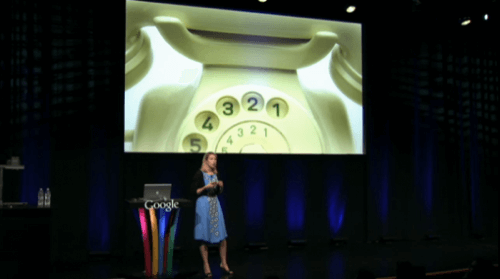
“How did we get here?” “Many years ago, if you wanted to get all the trivia about a painting in the MOMA, you would’ve had to spent a day in the library.” By 1950, the telephone allowed you to call the librarian. 1995: CD-ROM-based encyclopedia. “But that was static information.”
9:47 AM: Today: real-time information. See if a painting is on tour, for example.
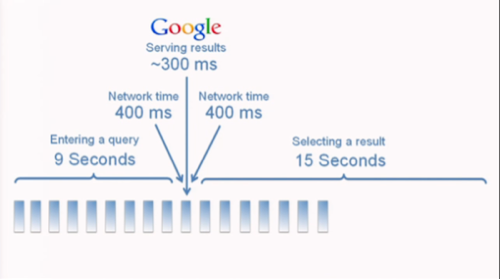
Where is time spent on search today? “We have made our algorithms very efficient.” Helping people to understand network time and rendering time in the browser.”
A search takes 24 seconds. Entering a query nine seconds. Selecting result 15 second.
9:50 AM: To speed things up, we have to bring the time spent entering a query down.
Google Instant
9:51 AM: Google Instant streams results as you type (pretty much what we expected).
Demo of Google Instant (you can try it here).
9:52 AM: Mayer shows that it only takes her six keystrokes to find information about a specific painting at the MOMA.
Switching between search predictions can be done with up and down arrows.
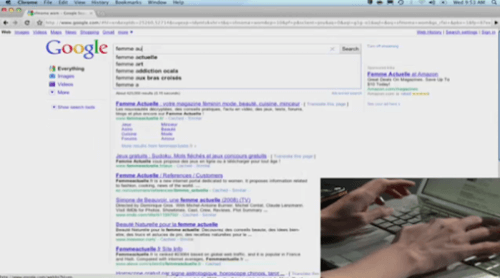
9:54 AM: “It’s not search ‘as you type,’ but ‘search before you type.'” “We can predict what you are likely to type and give you those results in real time.”
9:55 AM: Google used this idea of “search before you type” as an April Fool’s joke 10 years ago.
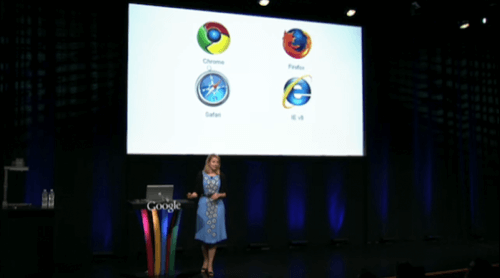
Will be available later today. Available on Google Chrome, Firefox, Safari and IE8. Will be part of the core Google search experience on Google.com in the U.S. starting this week. International sites – Germany, Italy, etc. – later this month.
9:57 AM: With this, Google will save its users 11 hours each second.
9:58 AM: Johanna Wright (director of product management on search) and Othar Hansson on stage.
The gears that make Instant Search work: instant results, predictions, scroll to search.
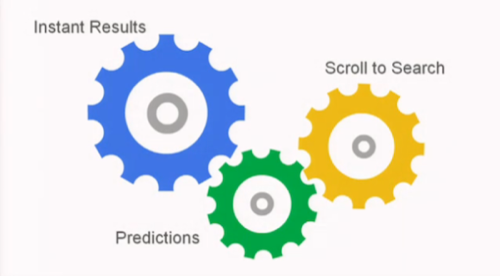
10:00 AM: Very staged, stiff presentation. Team shows how weather for San Francisco comes up in Instant Search with just one keystroke.
Second example: auto-completes “The Girl with the Dragon Tattoo” – black text in search box shows what the user typed – grey text is the predicted search.
“It’s not quite psychic, but it’s very clever.”
10:03 AM: Third example: “Yosemite” – use arrow keys to switch between predictions (“scroll to search”).
10:04 AM: The real power in this is when all of these gears work together (“feedback”).
More examples (“Addams family”).
10:06 AM: “What the heck is the search button still there for?”
Same results as you are used to. “If you know how to use Google Search today, you know how to use Google Instant.”
10:08 AM: Yet another example.
10:10 AM: A sneak peek of what’s coming soon: instant search for mobile. Coming later this Fall (we can see how this would be even more useful on mobile.

Video of user testimonials from usability lab. Girl: “It was pretty fabulous.” Old guy: “I appreciate that you made it easier for us old guys to use the computer.”
The Engineering Behind Instant Search
10:14 AM: How can we make this vision a reality? How can we create a user interface that’s easy to use? How can we make it useful on your computer? How can we make it work without melting our data centers?
Google tried this a long time ago. Unless the prediction works well, it’s not effective to even try instant search – too costly to implement and not useful for users.
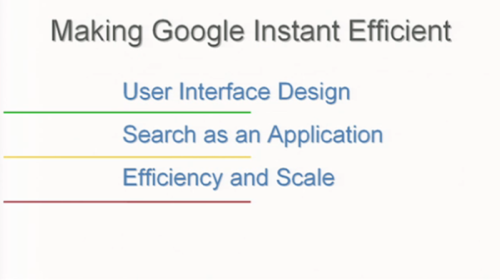
10:16 AM: Now: With predictions, this can be done. Google tested this internally and then did live experiments with millions of users. “People learn how to use this very quickly.”
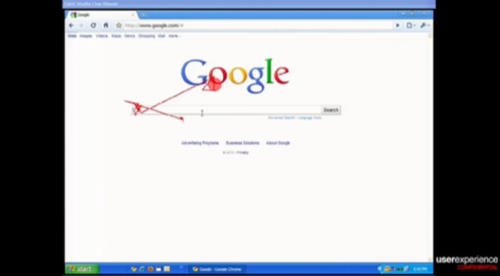
Video of eyetracking study. Shows the power of the predictive text and how fast users learn to use the new system.
10:20 AM: Results pages are now in AJAX. Explain the HTTP flow behind Instant Search. “We had to optimized a lot of JavaScript and work around browser performance issues.”
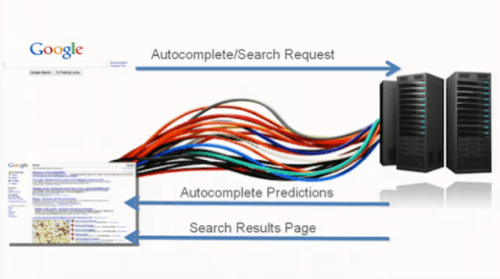
10:22 AM: “How do we do this without melting down our data centers.”
If Google Instant did a new search for every letter you typed, this couldn’t work. Google can’t handle 20 times amount the search traffic.
How does Google scale this? Optimizations: prioritizes searches that are the most likely. Checks if users is doing searches on another server. Results cached.
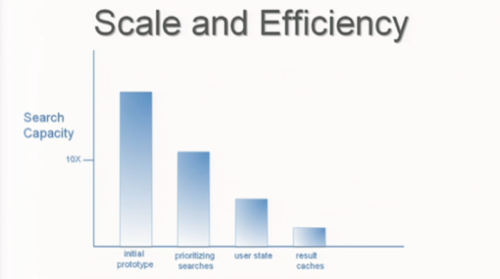
10:26 AM: “We work on search because we are engineers. The scale of the problem makes it interesting. But most importantly, we work on search because we believe it matters to people. Helps them make better decisions.”
Last year alone, Google quietly release over 500 changes to search. “But occasionally, we launch changes that fundamentally change how you use search.”
“It doesn’t just make search faster, but also more fun, fluid and interactive.”
10:28 AM: Google Instant was a massive change that touched almost every part of how Google serves up results.
10:28 AM: Mayer back on stage: Search at the speed of thought.
What makes search better: fun, comprehensiveness and understanding (understanding users’ intent and the Web at large).
Mayer: “Google Instant Search is a quantum leap for search.”
10:30 AM: Over the year, Google Instant will save 350 million hours of Google’s users time.
In closing: a Bob Dylan-inspired ad for Google Instant.
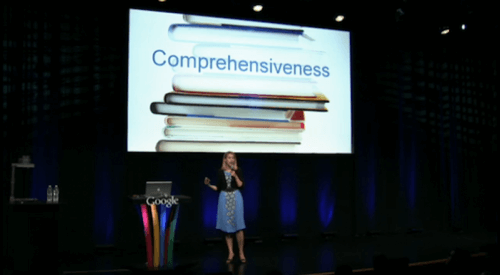
Q&A
10:32 AM:Q: Robert Scoble: When will this be in browsers? A: “This is something we are working on. We expect within the next few months.”
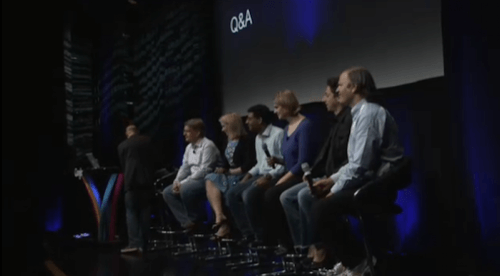
10:34 AM:Q: Effect on AdWords. A: No effect on this. Clicks are what matters anyway.
10:35 AM:Q: About 20% of queries are currently unique. How will this affect this metric? A: We don’t know yet.
10:36 AM: Q: How will this fit in with user’s search history. How will these results be tied in there? A: In Web history, queries where you did a click will show, as well as results where you paused for more than three seconds.
10:36 AM:Q (from Irena Slutsky): There seems to be a block list (including for Irena’s last name). A: We filter for violence, hate and pornography. As a result, if you are typing something that’s not appropriate, we won’t show those results until you hit enter.
10:38 AM:Q: How much personal information is needed to make this work and fast? How much more pressure does this put on Google’s data centers? A: Personal information: unchanged. For data centers: cost of search has been growing anyway and this is in line with Google’s predictions.
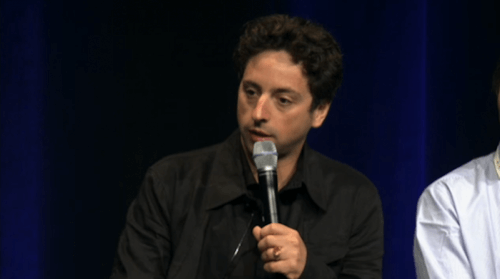
10:40 AM:Q for Sergey Brin: Rate of innovation in user interface. Where will this take us? A: This is a new dawn for computing. Things were rather static on the desktop. Over the past several years on the Web (based on the capabilities of browsers, etc.) there is a lot of exciting work going on. This is just a piece of a really changing landscape of computing. The things that will come out from Google and others over the next 10 years will really change how you interact with computing devices.
10:42 AM:Q (Ben Parr of Mashable): Impact on SEO. A: Ranking stays the same. Behavior and the kind of searches we see may change, however. That’s a longer term effect and we will understand it better over time.
10:43 AM:Q: Will this be made available around the world, including China? A: Google plans to roll this out everywhere, including the Hong Kong site.
10:44 AM:Q: Do users want faster search? A: yes.
10:45 AM:Q for Sergey: Are you concerned about the fact that we are giving up some privacy to get these better search results: A: Users place a lot of trust with us. We have to be great stewards of your information. Google Instant isn’t any different in that respect.
10:46 AM:Q: How will behavior and search change over time? A: As you use it more, you may do more searches in neighboring topics. Easier to explore a topic.
10:47 AM:Q: How many users didn’t want this during testing? How does this relate to Caffeine? A: Some users turned it off (there is a switch that allows you to turn it off). Very small percentage. They mostly turned it off because they were on slow connections. About Caffeine: not directly related, but the faster and real-time index made this a bit harder.
10:49 AM:Q: Is this the death of SEO? A: We’re sure the SEOs are smart and can catch up with us.
10:50 AM:Q (for Sergey Brin): Did you ever think this would be possible? A: Yes – but it’s really thanks to the advance of computing power that this is now possible.
10:51 AM:Q: Lots of people consume the content that a very small percentage of users create. How can you change that? How can you get more people to contribute? A (Brin): To do a great job at search, we need lots of content. We use AdSense to help people make money from their content. Authoring tools like Blogger, Docs etc. We don’t expect people to create all their content on Google.
10:53 AM:Q: Plans to make this even faster or are the technical limits at present? A: “Today we will enjoy the speed of this and tomorrow we will work on making this even faster.”
10:54 AM:Q (Irena Slutsky from AdAge): How does this affect smaller brands. Does the lower half of the page and page two still matter? A: The user intent doesn’t change. If you use page two less, that means you are getting to what you want faster. This is a user-focused launch. We are focused on our users and believe that this is also good for our advertisers.
10:56 AM:Q: If people conduct more searches now, how will users’ interaction with ads change? How often do they stop and click now? A: We focus on the user experience. The other effects will follow.
10:57 AM:Q: What about mobile? When will Google release this in Japan and China? A: For both questions:coming in the next few months.
10:59 AM:Q: Can you change the number of suggestions made in the auto-complete? A: No – but we always test different UIs.
11:00 AM:Q (Danny Sullivan of Search Engine Land): Changes seem to put even more focus on the top result. How do you improve those results? A: Ranking is a problem we obviously work on all the time. This stuff is tough and search quality is not always perfect.
And that wraps it up for today. Thanks for reading everybody!

















